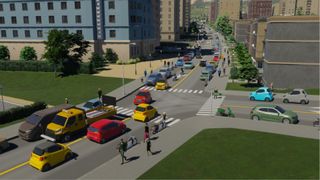Cities: Skylines 2's economy isn't a sham, but it is bugged
Supply and demand aren't working as intended

Cities: Skylines 2 features a robust economic simulation where individual businesses generate realistic demand for certain goods that can be satisfied either by local industries or by imports from outside connections. At least, that's how it's supposed to work - the reality is that these systems aren't working as intended, and while initial fears that the economy is a "deception" seem to be overblown, developer Colossal Order has acknowledged that there are some serious bugs to be fixed.
This all stems from a post on the Cities: Skylines 2 subreddit yesterday titled "all resource management in the game is a deception." The details are a little complicated, but basically this post found that commercial and industrial buildings don't actually need the goods they're supposed to demand in order to generate income, and that there's something seriously wrong with how imports and exports to external connections work.
With further testing, other players found that they were experiencing some of the same issues, but the results seemed extremely inconsistent. In this example, industrial buildings actually did take the goods they're supposed to need from local cargo terminals, but commercial buildings didn't. Further, it seemed like cargo terminals were driving their own need for external goods, regardless of what the city actually needs.
If all this seems confusing, I'm right there with you, but the basic gist is that the Cities: Skylines 2 economy is not representing the realistic push and pull of supply and demand that early advertising materials suggested it might. Many players, already frustrated by the game's awful performance issues, were not inclined to give the devs the benefit of the doubt on what's happening here, but the studio has since confirmed in a forum post that the economy is suffering from bugs - not deceptive design.
There are three points that the studio's currently looking into, according to a Colossal Order community manager who goes by co_avanya.
- City services only trade with outside connections, even when storage companies in your city have the resources they need. They should of course be able to purchase the resources your city produces locally.
- Harbors are mainly trading with your city’s storage companies, not other zoned buildings or city services. As you would expect, they should be able to trade with all zoned buildings and services, allowing your city to import and export through them.
- We’re investigating reports that indicate the cargo terminal is affected by the same or an issue similar to the harbors.
"It’s also worth noting that transportation distance affects costs. We expect that your businesses will prefer the closest storage facilities over a further away harbor/cargo terminal, however, that does not explain the reports we’re seeing."
One of the principal criticisms of the original Cities: Skylines was that it was much more of a "city painter" than a city builder - in other words, it emphasized letting you build an attractive little town at the expense of offering a robust management simulation. The sequel's economic simulation seemed poised to address that issue, so it's particularly disappointing to see this aspect of the game bugged at launch. Patches have already gone some distance in addressing the game's performance problems, so here's hoping fixes for the simulation itself won't be far behind.
Sign up to the GamesRadar+ Newsletter
Weekly digests, tales from the communities you love, and more
There's a reason it's tough to compete with the best city-building games.

Dustin Bailey joined the GamesRadar team as a Staff Writer in May 2022, and is currently based in Missouri. He's been covering games (with occasional dalliances in the worlds of anime and pro wrestling) since 2015, first as a freelancer, then as a news writer at PCGamesN for nearly five years. His love for games was sparked somewhere between Metal Gear Solid 2 and Knights of the Old Republic, and these days you can usually find him splitting his entertainment time between retro gaming, the latest big action-adventure title, or a long haul in American Truck Simulator.
Most Popular







